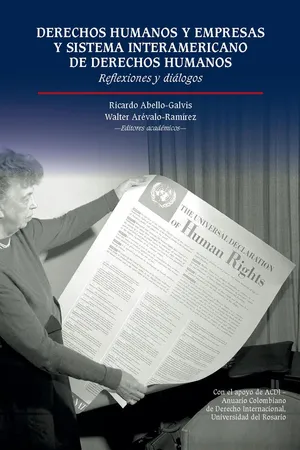
Derechos humanos y empresas y Sistema Interamericano de Derechos Humanos
Reflexiones y diálogos
- 421 páginas
- Spanish
- ePUB (apto para móviles)
- Disponible en iOS y Android
Derechos humanos y empresas y Sistema Interamericano de Derechos Humanos
Reflexiones y diálogos
Descripción del libro
El presente libro es una obra colectiva que refleja el desarrollo de los derechos humanos en el país, específicamente en la Facultad de Jurisprudencia de la Universidad del Rosario.Es clara la intención de educar para ellos e investigarlos si queremos tener una sociedad más justa y equitativa, en aras de lograr la paz en Colombia, así como lograr que tengan una mayor protección en la región.En este sentido, se lograron las dos intenciones y etapas que acompañaron el proyecto de crear el Congreso Anual de Derecho Internacional en la Facultad: por un lado, atender la necesidad de una obra colectiva de proyección internacional que abarcara, desde diferentes posiciones y escuelas, los nuevos debates relativos a la relación evolutiva entre empresas y derechos humanos y los debates recientes sobre el alcance y eficacia de la jurisprudencia y funcionamiento del sistema interamericano; por otro, la necesidad, como comunidad epistémica, de establecer un foro regional cuyo eje fuera Colombia, para el desarrollo y promoción de los más selectos debates de derecho internacional.
Preguntas frecuentes
- El plan Essential es ideal para los estudiantes y los profesionales a los que les gusta explorar una amplia gama de temas. Accede a la biblioteca Essential, con más de 800 000 títulos de confianza y superventas sobre negocios, crecimiento personal y humanidades. Incluye un tiempo de lectura ilimitado y la voz estándar de «Lectura en voz alta».
- Complete: perfecto para los estudiantes avanzados y los investigadores que necesitan un acceso completo sin ningún tipo de restricciones. Accede a más de 1,4 millones de libros sobre cientos de temas, incluidos títulos académicos y especializados. El plan Complete también incluye funciones avanzadas como la lectura en voz alta prémium y el asistente de investigación.
Ten en cuenta que no será compatible con los dispositivos que se ejecuten en iOS 13 y Android 7 o en versiones anteriores. Obtén más información sobre cómo usar la aplicación.
Información
SECCIÓN 1
DERECHO INTERNACIONAL DE LOS DERECHOS HUMANOS Y DESARROLLOS SOBRE DERECHOS HUMANOS Y EMPRESAS
Universality at the cross-roads: current trends in inter-state negotiations at the United Nations and International (Human Rights) Law
Foreword
The role of the United Nations and International Law in contemporary State legitimacy
Índice
- Portada
- Resumen
- Portadilla
- Página legal
- Contenido
- Prólogo
- Sección 1 Derecho Internacional de los Derechos Humanos y desarrollos sobre derechos humanos y empresas
- Addressing Transnational Corporate Human Rights Abuses through Soft-Law and Transnational Human Rights Litigation
- Las obligaciones de las empresas en virtud del Derecho Internacional Retos y oportunidades en materia de empresas y derechos humanos
- Obligaciones de los Estados en materia de empresa y derechos humanos en el marco de proyectos de infraestructura de alto impacto
- El camino hacia un tratado vinculante sobre empresa y derechos humanos
- La inmigración en el marco jurídico internacional de los derechos humanos La necesidad de un replanteamiento
- Sección 2 Sistema Interamericano de Protección y Promoción de los Derechos Humanos
- Lo que se ha dicho y lo que no se ha dicho sobre la cuarta instancia en el Sistema Interamericano de Derechos Humanos un análisis crítico a la luz de la responsabilidad internacional del Estado por el hecho de los jueces*
- El Derecho Internacional al rescate de la Convención Americana sobre Derechos Humanos El caso argentino
- Las contribuciones del Sistema Interamericano de Derechos Humanos para la protección a la libertad de expresión en Internet
- Sección 3 Derecho Internacional Penal
- Hate speech and incitiement to further crimes against humanity and war crimes in the framework of the international criminal court
- Los autores